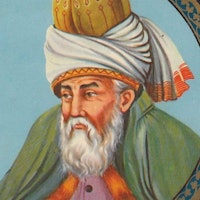From Your Soul
Topic: Immanence & Transcendence
When you do things from your soul,you feel a river moving in you, a joy.When actions come from another section,the feeling disappears.Don’t let others lead you. They may be blind,or worse, vultures. Reach for the ropeof God. And what is that?Putting aside self-will.Because of willfulness people sit in jail.From willfulness, the trapped birds’ wings are tied.From willfulness, the fish sizzles in the skillet.The anger of police is willfulness.You’ve seen a magistrate inflict visible punishment.Now see the invisible.If you could leave selfishness, you would seehow your soul has been tortured.We are born and live inside black water in a well.How could we know what an open field of sunlight is?Don’t insist on going where you think you want to go.Ask the way to the Spring.Your living pieces will form a harmony.There is a moving palace that floats through the air,with balconies and clear water running in every part of it,infinity everywhere, yet contained under a single tent.
Jalal ad-Din Muhammad Rumi, born on September 30, 1207, and also known as Jalaluddin Mevlana (Mawlānā) Rumi, J. M. Rumi, or simply as Rumi in the Western world, was an extraordinary poet, philosopher, and Sufi mystic. He was a prominent figure in the Islamic world, born in the region of present-day Afghanistan, then within the greater Persian Empire, and later settled in Konya, present-day Turkey. Rumi's passionate love for humanity and his deep spiritual insights transcended geographical, linguistic, and cultural barriers, making his poetry and teachings resonate not only within the Islamic world but also with audiences globally.
Rumi's spiritual journey led him to develop a unique approach to Sufism that emphasized love, tolerance, and the pursuit of enlightenment. He created a fusion of traditional Islamic beliefs with mysticism, nurturing a school of thought that flourished in his followers. They established a sect known to the Western world as the 'Whirling Dervishes', a term derived from their mesmerizing practice of whirling as a form of physical meditation. The proper name for this branch is the Mevlevi order, dedicated to preserving and promoting Rumi's teachings.
In addition to being a mystic, Rumi was an accomplished scholar and theologian who left behind an impressive literary legacy. His best-known work, the Mathnawi or Masnavi, is a six-volume poetic epic that explores themes of love, divine mystery, and human connection to the spiritual world. Rumi's poetic style is marked by profound emotion and philosophical depth, weaving metaphors and allegory to create timeless pieces that continue to inspire readers today. Rumi's influence reaches far beyond his time, as his teachings on love, compassion, and unity continue to touch the hearts of millions, transcending barriers of religion, culture, and era.
Rūmī Jalāl al-Dīn. The Essential Rumi. Translated by Coleman Barks, HarperCollins, 2004 [Moving Water by J. M. Rumi].

Jalaluddin Mevlana Rumi
Theme: Immanence and Transcendence


Love Makes All the Difference: An Introduction to Rumi, by Jason Espada
Resources
Related Quotes
Copyright © 2017 – 2024 LuminaryQuotes.com About Us